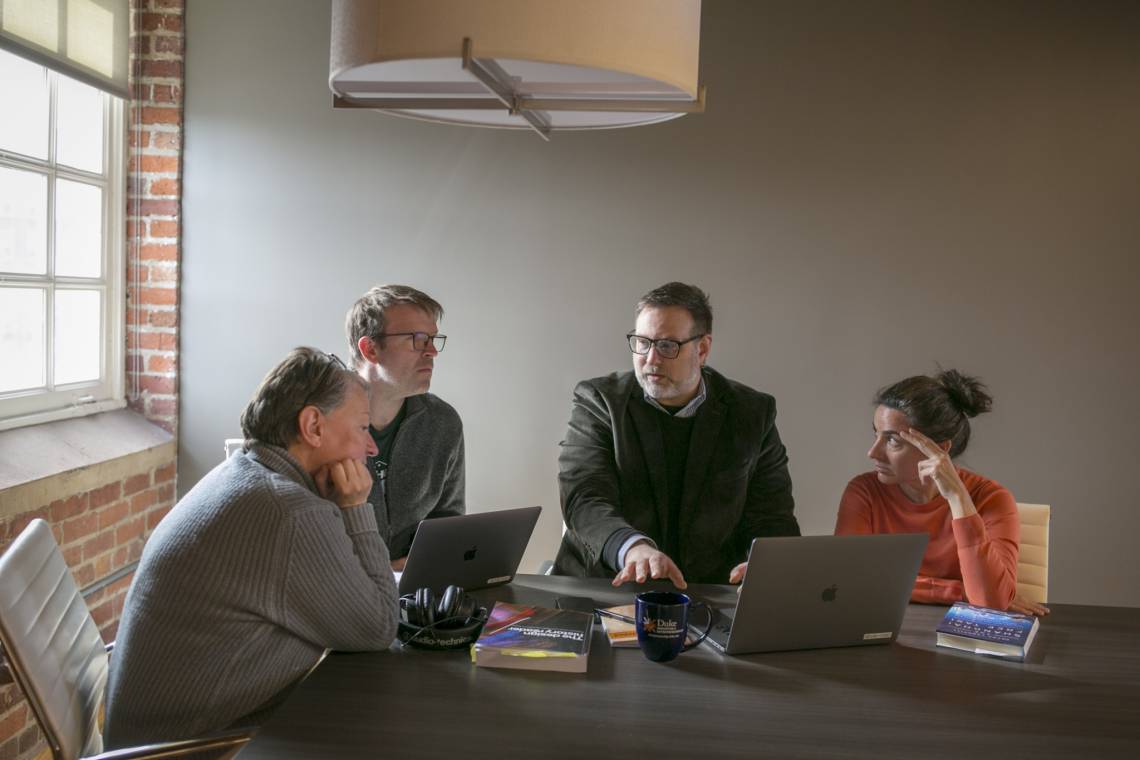
When Matthew Rascoff was told he had three weeks to move all classroom instruction at Duke Kunshan University online, it stressed him out – but he also saw a chance to excel.
“I knew we had to drop everything, because this has to succeed,” said Rascoff, who leads Duke’s digital education efforts. “It was also an enormous opportunity to build community across the campuses.”
When the coronavirus outbreak locked down the Duke Kunshan campus, it shattered the original plan for in-person classes to resume Feb. 3 after the Lunar New Year holiday. That same day, Rascoff was told the semester would resume Feb. 24 instead – but all online, and with 579 undergraduate students and more than 100 faculty all scattered across China and well beyond, in many different time zones and with varying levels internet access and other technology.
“The pressure was on,” Rascoff said. “But Duke is equipped to do this. We spent years building up the infrastructure so we have the capacity and resilience to respond in a moment of crisis.”
Duke has spent the last seven years helping faculty build 60-plus online courses, understanding how learning happens in different disciplines, and creating participatory and engaging classrooms.
“Having this team together in one place meant that there was basically a place to go when Duke Kunshan is in this situation and needs help,” he said. “It takes confidence to say, we may not know how we’re going to get there, but we're going to get you there somehow.”
That happens by identifying the desired learning outcomes first and designing the course materials, exercises and assignments backward from there.
“That is a very sound basis for taking an in-person course online quickly,” Rascoff said, “because the learning outcomes are the same either way. Technology is an enabler, but the key is the human interaction. Whether face-to-face or online, we're trying to support good evidence-based teaching and learning practices however it happens.”
In the current crisis, the first task was to complete the seven-week term that was interrupted by the holiday. That involves augmenting an existing, in-progress curriculum with some live sessions on the Zoom online conferencing platform.
But with no way of knowing when campus can reopen, the greater challenge is the full seven-week term starting March 23 that Duke Kunshan must also be prepared to conduct entirely online.
“These are courses that in some cases haven't been taught before,” Rascoff said. “Technology is often seen as cold, but in this case, we’re using it to recreate the student community, give people support and help engage them.”
That’s happening through human expertise and compassion – faculty, Rascoff’s Duke Learning Innovation team and the Duke Kunshan Center for Teaching and Learning – coupled with tailor-made tech: Zoom for live audio and video put together on the fly by Duke’s Office of Information Technology); the Sakai learning management system for course materials, exams and quizzes and message board discussions; and the Coursera learning platform.
The libraries at both Duke and Duke Kunshan are licensing electronic resources for students and faculty who don't have access to their own books or libraries. Duke has brought many of the globally-scattered Duke Kunshan faculty to Durham to build their online class content.
“It's very much a team effort,” Rascoff said. “It’s about what students need to learn, and that doesn't actually change when you move a face-to-face class online. It just the means to get there that changes, and that's a solvable problem. We want to make sure the faculty and the students feel this is a joint effort, that we're in this together.”
Scott MacEachern, vice chancellor for academic affairs at Duke Kunshan, shared Rascoff’s feeling of opportunity amid crisis.
“This will require students, faculty and staff to stretch themselves in a variety of ways,” MacEachern said. “That’s always a good thing. People are going to gain a useful set of skills by learning how to provide and digest this content.”
MacEachern said he’s confident Duke Kunshan can make their plan work because students and faculty are enthusiastic and because of the resources Duke has committed to the effort. He also called it a chance for the university to embody the globalism that’s at the core of its mission.
“We now have an opportunity to put this concept into practice,” he said, “in a way we never expected.”